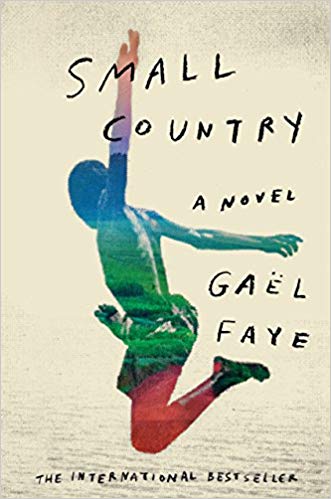|
Successful French hip-hop artist Gaël Faye was born in 1982 to a French father and Rwandan mother who lived as expatriates in Burundi, a country in the Great Lakes area of Eastern Africa. Faye describes the bulk of his creative work in music, screenplays and fiction as rooted in poetry. He began writing poems at an early age, anchoring himself to their composition throughout his abruptly uprooted adolescence, and then expanding his small works into song and prose. He has recently emerged as a dexterous talent, winning numerous literary prizes, including the prestigious Prix Goncourt des lycéens for Petit Pays, published 2016 in France and selling over 700,000 copies. Sarah Ardizzone translated Faye’s novel into Small Country, now published in over thirty countries worldwide. The book opens just before the first democratic election in 1993 of Melchior Ndadaye in Burundi, bordered by Rwanda, Tanzania and the Congo. There, life is fairly carefree for ten-year-old Gabrial, living with his expatriate French father, Rwandan mother and little sister Ana in the capital of Bujumbura. Ten year old Gabriel (Gaby) and his pack of mischief making friends sneak beers, gossip about girls, avoid Francis the bully, sell stolen mangoes and sneak Supermatch cigarettes. Faye’s inspiration for these characters comes from a lyric he wrote days before the civil war. Pili Pili sur un Croissant au Beurre; it’s a song of privilege and boredom and from a child who does not yet understand what the future holds. The 1993 assassination of Melchior Ndadaye will come just three months after his election in a military coup that begins a ten-year civil war, killing over a million Hutus and Tutsis in mutual prosecution of physical difference. The violence will monstrously spread, propelling Rwanda into genocide rooted on an accepted colonial concept of ethnicity. Faye writes, “A glowing, uninvited ghost is showing up at regular intervals to remind us that peace is merely a brief interlude between two wars...we didn’t know it yet, but the hour of the inferno had come, and the night was about to unleash it’s cackles of hyenas and wild dogs.” Small Country explores the grief that accompanies a boy plunged from the familiar into the horrific. Gaby first steadies himself by writing poetic letters to his French pen pal Laure. He befriends an elderly widow with large bookshelves, immerses himself in reading instead of following friends into guerilla warfare. Eventually he must make the worst of choices. It’s an ambitious character development, and at times Faye loses a little authenticity, attempting to balance seasoned expository with the naïve perspective of a boy. Faye’s own boyhood was lost to war, and he followed his mother to France where he describes being so filled with injustice and the shock of a new culture that he didn’t unpack his suitcase for months. Like Gaby, he was a child traumatized by the evil that passed though and transformed Africa. He writes, "Genocide is an oil slick: those who don't drown in it are polluted for life." Within that darkness, Gaby loses not only freedom but identity, abandoning his former self in order to survive. Faye illuminates the brutal struggle of refugee experience through what at times can feel like disjointed memoir. Yet, he delivers a perspective not often shared about the Rwandan genocide. The story is slow building and deeply moving, told in simple beautiful language, and a worthy eye-opening read. ~Ann Scott Originally published July 26, 2018 in the Aspen Daily News
0 Comments
Your comment will be posted after it is approved.
Leave a Reply. |
Adult News & reviewsLibrary news, info about upcoming events, reviews of books and films, and a look at the topics that affect us as a library. Archives
July 2023
|
General |
Borrowing |
About |


 RSS Feed
RSS Feed
